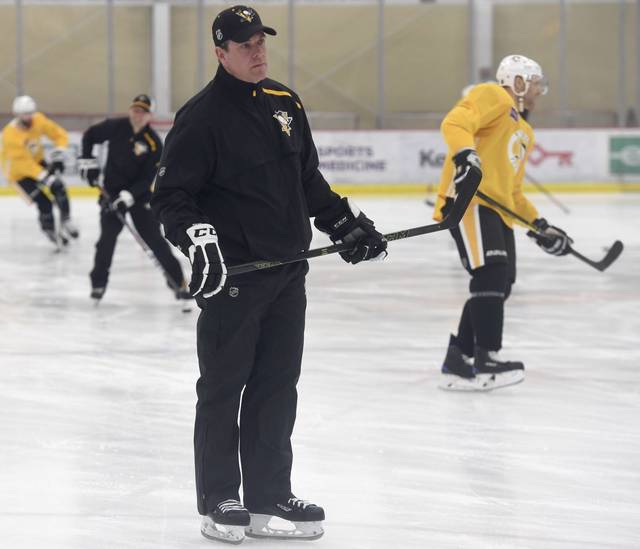Fresh off being swept out of the first round of the Stanley Cup playoffs, the Pittsburgh Penguins on Thursday presented a united front that indicates changes are coming.
Not a coaching change, of course.
Where Penguins players remain committed to keeping their core together, general manager Jim Rutherford and coach Mike Sullivan made it clear this is a team with an identity crisis.
That crisis isn’t in the identity of its coach, even though Sullivan enters the final year of his contract. Normally, that would make him a lame duck. But Sullivan showed his strengths in his first two seasons, using consistency, control and conviction in leading the Penguins to back-to-back Cup championships.
While that honeymoon is over, the show of solidarity with Rutherford made it clear Sullivan is here to stay. Instead, certain Penguins players will be shown the door.
To the players, losing four consecutive games to the New York Islanders was simply a matter of not scoring enough goals. To the Penguins’ brain trust, it was more about another missing ingredient: the willingness to do whatever it takes to win.
That’s their way of saying the problem wasn’t Sullivan’s strategy but rather the players’ effort and execution, an explanation that is sure to go over well in the dressing room.
“The identity of this group, in order to have success, regardless of what your strategy is, you have to become a team that’s difficult to play against,” Sullivan said. “Everybody has to be accountable for it, and everybody has to take ownership of it.”
Everyone from the front office to coaching staff to players should be willing to take responsibility for the Penguins’ playoff failure. Taking accountability for their shortcomings is another story, one that will shape the future of this franchise.
“When you get swept and you lose the way we did, there’s always going to be questions, and you try to evaluate things,” Penguins captain Sidney Crosby said. “But, as players, you have to evaluate your own game and figure out what you need to do better. As far as looking at it from a management side or a coach’s side, it’s up to them to decide those things.”
That starts with Sullivan, who talked about the challenge of a 100 percent buy-in from his players and how the Penguins lost an edge that led them to the Cup in 2016 and ’17. That appeared to be an admission the Penguins weren’t all-in.
From the start, Sullivan’s message has been consistent: Play the right way. The Penguins built three Cup champions around supporting the strengths of Crosby, Evgeni Malkin and Kris Letang but have followed with second- and first-round exits in each of the ensuing seasons.
Sometimes, the message starts to fall upon deaf ears. Their inconsistent play this season is a sign the Penguins could be guilty of tuning out Sullivan’s insistence on reducing risks and playing instead to their personal preferences.
“There’s a discipline and a certain diligence associated with winning at this time of the year,” Sullivan said, “and, as a group, we all have to take responsibility because we didn’t live up to them.”
Whether Sullivan holds Penguins players, especially their stars, accountable for their mistakes will ensure more success or seal his fate. If he can’t convince Crosby, Malkin and Letang to take responsibility for the regular-season inconsistency and postseason shortcomings, Sullivan has no shot at selling the rest of their teammates on playing the right way.
It doomed Dan Bylsma, another Cup-winning coach.
“We just have to be better as individuals, finding our roles in the lineup and make our team better,” Letang said. “It’s too easy to say, ‘Hey, I’ll change 10 guys, and we’ll have a better team.’ That’s not the way it works. You have to work with what you have in your room.”
Where Rutherford will attempt to upgrade what the Penguins have in their room, it’s up to Sullivan to make it work. The challenge is to shape the Penguins into a team that remains offense-oriented but plays with a defensive conscience. That sounds promising in proposal but more difficult in practice.
Letang is a perfect example, considering his critical turnovers that led to goals in Games 1 and 4. Letang played at a Norris Trophy level this season, so it is understandable he was defensive and defiant when asked if he needed to play a more responsible style. But if Letang would have been held accountable for the Game 1 gaffe in overtime, perhaps it wouldn’t have happened again in Game 4.
That’s where Sullivan has to use his upper hand: ice time. He controls what players covet most, and he needs to use it to create the accountability that he is demanding of them.
If the Penguins want to become a team that’s difficult to play against, they have to be a team that’s not difficult to coach.








